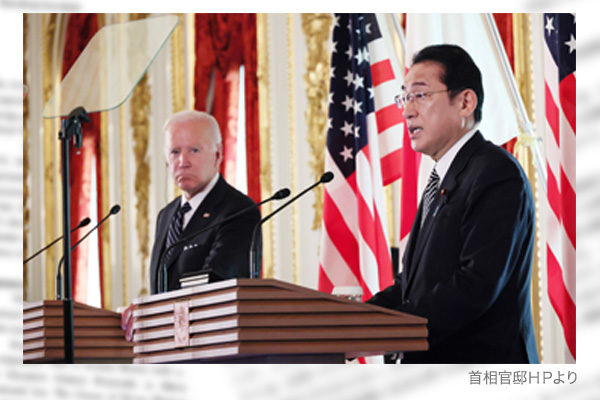While Germany had decided to increase its defense spending to more than 2% of its gross domestic product in response to Russia’s aggression against Ukraine, the Japanese government had been reluctant to set a numerical defense spending goal. At his meeting with U.S. President Joe Biden on May 23, however, Japanese Prime Minister Fumio Kishida offered a “substantial increase” in defense spending. Later, the government set forth a policy of “enhancing defense capabilities fundamentally within five years” in its revised draft of Basic Policies for Economic and Fiscal Management. While appreciating the Kishida government as having expressed a clear will, I would like the government to steadily fulfill the promise of “substantial increase” in formulating an annual defense budget towards the end of the year.
MOF agreed to “substantial increase”
While Kishida had earlier taken a position that any defense spending level should be the result of accumulating necessary expenses, former Prime Minister Shinzo Abe and his followers in the ruling Liberal Democratic Party had urged that the government demonstrate a national will regarding how to enhance defense capabilities. Kishida finally decided to take advantage of the meeting with Biden to specify a direction of defense spending.
Japanese government officials said that Ministry of Finance officials joined other bureaucrats to discuss wording on defense spending in a Japan-U.S. joint statement to be issued in English and Japanese after the Kishida-Biden summit. They agreed to describe a defense budget increase as “substantial” in English, while MOF officials took leadership in the translation of the word into Japanese, the officials said.
Since the end of World War II, the MOF has taken a key role in limiting Japan’s defense spending to roughly 1% of its GDP. In a document submitted in April to an advisory panel to the finance minister, the MOF said, “defense capabilities should build on the stability of national life, economy and finance and on fiscal conditions,” indicating an apparent bid to calm down arguments for increasing defense spending.
During the discussion prior to the Japan-U.S. summit, MOF officials, while maintaining the traditional stance, admitted the need to increase defense spending in response to the deterioration of Japan’s national security environment and endorsed the “substantial increase,” according to the government officials. In the Genron TV Internet program hosted by JINF President Yoshiko Sakurai, former Defense Minister Itsunori Onodera predicted the government’s Basic Policies for Economic and Fiscal Management may support an increase in the defense budget for the first time since the Basic Policies were launched in 2001.
National defense is a supra-partisan matter
Politicians’ attitudes are now to be put to test. Defense spending may become one of issues in campaigns for a House of Councilors election in July. While the Japanese Communist Party’s claim that the Self-Defense Forces are unconstitutional is out of question, the Constitutional Democratic Party of Japan, the largest center-left opposition party, calls for a “well-balanced defense spending” apart from any target total value even under the slogan of “steady national security.” Its leader Kenta Izumi said, “As the national budget is limited, higher priority should be given to education spending.” The situation in Japan differs far from that in Germany, where the decision to increase defense spending has been made by the Olaf Scholz government led by the center-left Social Democratic Party that had once tabooed military expansion and nuclear weapons.
Among other Japanese opposition parties, the Japan Innovation Party has vowed to develop “proactive defense capabilities” by increasing defense spending and amending Article 9 of the constitution to stipulate the existence of the Self-Defense Forces. I hope that constitutional amendment supporters would increase to top a two-thirds majority in the House of Councilors to increase momentum for constitutional amendments. National defense is a supra-partisan matter. Politicians in both the ruling and opposition camps are required to seize and quickly respond to changes of the times.
Takashi Arimoto is a Planning Committee member at the Japan Institute for National Fundamentals and publisher of Monthly Magazine SEIRON at the Sankei Shimbun newspaper.


